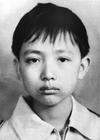Difference between revisions of "Lai Ning"
imported>Ciic m |
imported>Ciic |
||
| (One intermediate revision by the same user not shown) | |||
| Line 1: | Line 1: | ||
[[File:ln.jpg|thumb|200px|right]] | [[File:ln.jpg|thumb|200px|right]] | ||
| − | |||
| − | + | '''Lai Ning''' (Chinese: 赖宁) was dubbed a young hero after he died at the age of 14 in 1988 while assisting firefighters to put out a forest fire in [[Sichuan]] Province. His death captured headlines of many newspapers, publishing long obituaries in memory of his bravery and nobility. Anecdotes of his deeds were soon circulating among the young peers, who were encouraged to learn from him. | |
| − | + | However, as time went by, the admiration for the hero boy faded as his name was occasionally mentioned and then barely remembered. Although he was elected in 2009 as the top 100 figures that deeply moved the people in the country since 1949, his legend lost its glamour as schools and parks moved his photos and sculptures out of sight. | |
| + | |||
| + | Should adults encourage children to offer help when the mission is out of their capabilities? The question puzzles many who knew Lai’s story in their childhoods and now have children of their own. "It is good to forget Lai Ning," Sohu.com, one of China’s biggest news websites, published its opinion when using a special page to cover the controversial issue. In one of its editorials, Zeng Xian, a critic from China Youth Daily, questioned if the adults set a wrong ethic code for the children who are induced to ignore the preciousness of their own lives to pursue moral glories. | ||
| + | |||
| + | Yet Sun Yunxiao, an expert on adolescents and also the first one who covered Lai’s story, frowned at the idea of completely denying the boy’s heroic identity. "His story is real, not fabricated, though people doubted pure nobility in such a multicultural society," Sun said. "Actually, the boy possessed lots of good qualities that are ignored by many of the young people nowadays," Sun said. | ||
[[Category:People]] | [[Category:People]] | ||
Latest revision as of 00:58, 17 August 2011
Lai Ning (Chinese: 赖宁) was dubbed a young hero after he died at the age of 14 in 1988 while assisting firefighters to put out a forest fire in Sichuan Province. His death captured headlines of many newspapers, publishing long obituaries in memory of his bravery and nobility. Anecdotes of his deeds were soon circulating among the young peers, who were encouraged to learn from him.
However, as time went by, the admiration for the hero boy faded as his name was occasionally mentioned and then barely remembered. Although he was elected in 2009 as the top 100 figures that deeply moved the people in the country since 1949, his legend lost its glamour as schools and parks moved his photos and sculptures out of sight.
Should adults encourage children to offer help when the mission is out of their capabilities? The question puzzles many who knew Lai’s story in their childhoods and now have children of their own. "It is good to forget Lai Ning," Sohu.com, one of China’s biggest news websites, published its opinion when using a special page to cover the controversial issue. In one of its editorials, Zeng Xian, a critic from China Youth Daily, questioned if the adults set a wrong ethic code for the children who are induced to ignore the preciousness of their own lives to pursue moral glories.
Yet Sun Yunxiao, an expert on adolescents and also the first one who covered Lai’s story, frowned at the idea of completely denying the boy’s heroic identity. "His story is real, not fabricated, though people doubted pure nobility in such a multicultural society," Sun said. "Actually, the boy possessed lots of good qualities that are ignored by many of the young people nowadays," Sun said.
